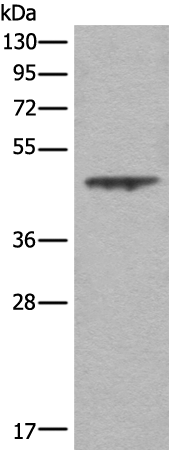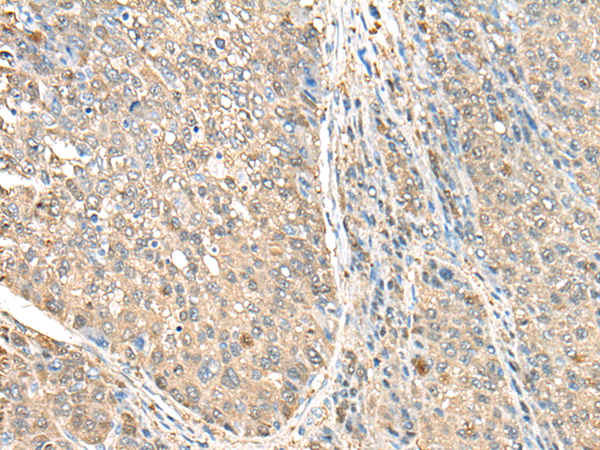

| WB | 咨询技术 | Human,Mouse,Rat |
| IF | 咨询技术 | Human,Mouse,Rat |
| IHC | 1/25-1/100 | Human,Mouse,Rat |
| ICC | 技术咨询 | Human,Mouse,Rat |
| FCM | 咨询技术 | Human,Mouse,Rat |
| Elisa | 1/5000-1/10000 | Human,Mouse,Rat |
| Aliases | ASS; CTLN1 |
| WB Predicted band size | 47 kDa |
| Host/Isotype | Rabbit IgG |
| Antibody Type | Primary antibody |
| Storage | Store at 4°C short term. Aliquot and store at -20°C long term. Avoid freeze/thaw cycles. |
| Species Reactivity | Human, Mouse, Rat |
| Immunogen | Fusion protein of human ASS1 |
| Formulation | Purified antibody in PBS with 0.05% sodium azide and 50% glycerol. |
+ +
以下是关于ASS1抗体的3篇参考文献,按文献名称、作者及摘要内容简要概括:
---
1. **"ASS1 Immunohistochemistry as a Diagnostic Marker for Citrullinemia Type I"**
*作者:Kho J. et al. (2019)*
**摘要**:研究评估了ASS1抗体在肝组织中的免疫组化检测效能,证实其在诊断I型瓜氨酸血症(尿素循环障碍)中的特异性,并强调其在区分代谢性疾病与其他肝病中的临床应用价值。
---
2. **"Argininosuccinate Synthase 1 (ASS1) Loss in High-Grade Neuroendocrine Carcinomas: Implications for Therapeutic Strategies"**
*作者:Huang H. et al. (2020)*
**摘要**:通过ASS1抗体检测发现,高级别神经内分泌癌中ASS1蛋白表达缺失与精氨酸剥夺疗法的敏感性相关,为靶向代谢治疗提供了潜在生物标志物。
---
3. **"ASS1 Deficiency in Mesothelioma: A Metabolic Vulnerability for Targeted Therapy"**
*作者:Szlosarek P.W. et al. (2013)*
**摘要**:研究利用ASS1抗体分析间皮瘤组织,发现ASS1表达缺失与肿瘤依赖外源性精氨酸的特性相关,支持使用精氨酸降解酶(如ADI-PEG20)进行精准治疗。
---
以上文献聚焦ASS1抗体在疾病诊断(如代谢障碍、癌症)及靶向治疗中的应用,涉及免疫组化、蛋白表达分析与临床转化研究。如需具体DOI或期刊信息,可进一步补充检索关键词(如“ASS1 antibody” + 疾病/技术)。
**Background of ASS1 Antibody**
The **argininosuccinate synthase 1 (ASS1)** antibody is a tool used to detect ASS1. a key enzyme in the urea cycle and arginine biosynthesis. ASS1 catalyzes the conversion of citrulline and aspartate to argininosuccinate, a critical step in detoxifying ammonia and producing arginine. Dysregulation of ASS1 is linked to metabolic disorders and cancers.
In clinical diagnostics, ASS1 antibodies aid in identifying **citrullinemia type I**, an autosomal recessive disorder caused by *ASS1* mutations, leading to ammonia accumulation and neurological complications. In cancer research, ASS1 is often downregulated in tumors (e.g., hepatocellular carcinoma, melanoma), forcing cancer cells to rely on extracellular arginine. This vulnerability is exploited in therapies targeting arginine deprivation, such as using pegylated arginine deiminase (ADI-PEG 20). ASS1 expression levels, detected via immunohistochemistry (IHC) or Western blot (WB), help stratify patients for such treatments.
ASS1 antibodies (monoclonal or polyclonal) are validated for specificity in various applications, including IHC, immunofluorescence (IF), and ELISA. Their role extends to studying metabolic reprogramming in tumors, drug resistance mechanisms, and urea cycle dysfunction. Understanding ASS1 expression through these antibodies provides insights into disease mechanisms and therapeutic targeting strategies.
×